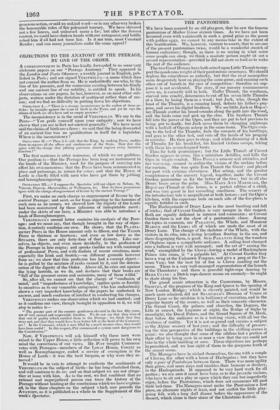OBJECTIONS TO THE ANATOMY OF THE PEERAGE, BY ONE OF
THE ORDER, A CORRESPONDENT in Paris has kindly forwarded to us some very elaborate papers on our " Peerage Anatomy." They appeared in the London and Paris Observer, a weekly journal in English, pub- lished in Paris; and are signed VERIPHILUS,—a name which does not conceal the author from us. He is undoubtedly one who, by the line of his pursuits, and the connexion existing between his-family and one ancient line of our nobility, is entitled to speak. In his observations on our papers, he has, however; as on most other sub- jects, written under the dictation of sentiment rather than of rea- son; and we find no difficulty in putting down his objections.
OBJECTION There is a strange inconsistency in the author of these ar- ticles: he inveighs against the want of birth in the Peers, and yet he says the claims of birth are all a farce and an empty pretence ! "
The inconsistency is in the mind of VERIPHILITS. We say to the Peers—" You pride yourself upon your antiquity now we have shown that you are in fact not ancient generally." We have never said the claims of birth are a farce : we said that the being descended of an ancient line was no qualification in itself for a legislator. Where is the inconsistency?
OBJECTION II.—" Then it is said, that the King, by making Peers, enables them to engross all the offices and emoluments of the State- How does this agree with the charge that jobbing parvenus almost engross every lucrative function ?"
The first sentence is utter nonsense, of which we are guiltless. Our position is—that the Peerage has been long an instrument in the hands of the Minister, used for the purpose of carrying into effect his own measures ; that the Peers have been remunerated in place and patronage, in return for votes; and that the House of Lords is chiefly filled with men who have got there by jobbing and boroughmongering.
OBJECTION HI.—" I suppose the Spectator will not object to Nelson, St. Vincent, Duncan Abercrombie, or Wellington, &c. How do these promotions agree with the charge of engrossment of favour by the ancient Peerage ?"
First, we make no such charge as engrossment of favour by the ancient Peerage; and next, so far from objecting to the honours of such men as he names, we showed how the dignity of the Lords had been maintained by these infusions of indisputable merit : under the skirts of one hero, a Minister was able to introduce a leash of Boroug.hmongers. VERIPHILUS s second letter contains his analysis of the Peer- age: and we must say, that though brought in the way of objec- tion, it entirely confirms our own. He Shows., that the PLANTA- GENET Peers in the House amount only to fifteen, and the TUDOR Peers to thirteen or fourteen; and even so low down as the STUARTS, there are only forty-four of that dynasty. Like our- selves, he objects, and even more decidedly, to the profusion of the Peerage in late reigns • and speaks (unlike us) with contempt of professional Peers, and with disdain of recent creations, more especially the Irish and Scotch ;—on different grounds however from us : we show that thisprofusion has had a corrupt object— he is galled by the mixture of ranks caused by it, and the deterio- ration of the dignity of the Order. Above all, he cries out against the lying heralds, as we do, and declares that their books are "full of the grossest errors and omissions, many of them wilful."
So, after all, we cannot see that the charge of "confusion of mind," and "imperfectness of knowledge," applies quite so forcibly to ourselves as to our venerable antagonist; who has undoubtedly shown a very imperfect knowledge of the papers he undertook to answer, and much confusion of intellect in conducting his charges.
VERIPHILUS makes one observation which we had omitted; and as it confirms our view, though brought in opposition to it, we will stop to notice it- " The greater part of the country gentlemen elevated in the last fifty years, are of very ancient and respectable families. We do not say that they were of that sort of quality which entitled them to the Peerage : we think that they were not, and that they would have been better left at the head of the Common- ers ! In the Commons, which is now filled by a much meaner class, theywould have been useful ! In this respect, Pitt commenced a system most dangerous to the Constitution !"
Now, if VERIPHILITS will ask himself why these men were raised to the Upper House, a little reflection will prove to his own mind the correctness of our views. Mr. PITT bought Commons' votes with Peerages—members of the Lower House, County as well as Boroughmonger, ended a service of corruption in the House of Lords : it was the tacit bargain, or why were they re- moved?
It would be in vain to attempt to eradicate the sentiments of VERIPHILus on the subject of birth—he has long cherished them, and will continue to do so • and on that subject we are not altoge- ther at issue with him. As to the rest, we feel confident that no rational and unprejudiced person can trace the history of the Peerage without landing at the conclusions which we have explain- ed, in the three chapters on the subject which now precede the Astaromar, as it is published as a whole in the Supplement of this week's Spectator.


















































 Previous page
Previous page